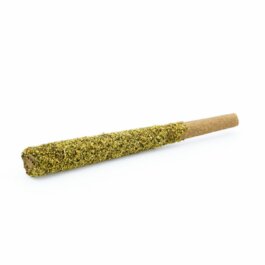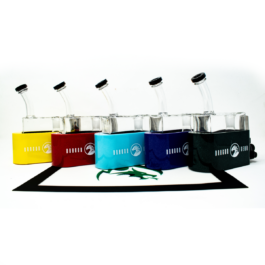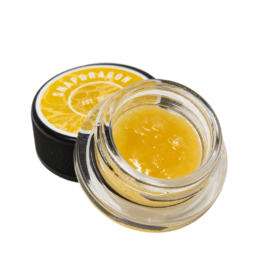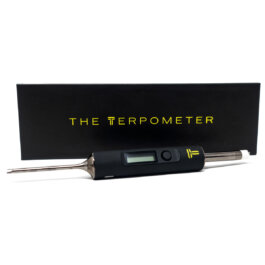No products in the cart.
The world of cannabis and its hundreds of compounds has expanded significantly over the past few years, providing consumers with a wide range of options to explore. One such option that has gained increasing popularity is THCA concentrate. This comprehensive guide will delve into the fascinating world of THCA concentrates, exploring the science, extraction process, consumption methods, potential benefits, risks, legal considerations, and more. Whether you’re a seasoned cannabis enthusiast or someone curious about this emerging product, this guide will provide you with valuable insights into the world of THCA concentrates.
Table of Contents
What is THCA Concentrate?
Differentiating THCA Concentrate from THC and CBD
How Does THCA Work in The Body?
Understanding the Extraction Process: THCA-Rich Hash, Kief, Live Resin vs Live Rosin
THCA Concentrates Common Uses and Consumption Methods
Tips for Choosing High-Quality THCA Concentrates
Potential Risks and Side Effects
Legal Considerations and Regulations Surrounding THCA Concentrates
Exploring Other Cannabinoid Concentrates: A Brief Overview
Frequently Asked Questions
What is THCA Concentrate?
THCA, short for tetrahydrocannabinolic acid, is a non-intoxicating cannabinoid in the raw cannabis plant. Unlike THC (tetrahydrocannabinol), which is psychoactive and produces the “high” associated with cannabis use, THCA does not have the same intoxicating effects in its normal state. However, when THCA is exposed to heat through a process known as decarboxylation, it then converts into the classic psychoactive cannabinoid we all know, Delta-9 THC, resulting in the euphoric and other pharmacological effects often associated with cannabis consumption. THCA concentrates are derived from raw cannabis plant material and, as the name describes, contain high concentrations of THCA, which can then convert into Delta-9 THC. These concentrates are typically created through a careful extraction process that isolates THCA from other compounds found in the plant.
Differentiating THCA Concentrate from THC and CBD
It’s essential to differentiate and understand THCA from other well-known but closely related cannabinoids like Delta-9 THC and CBD. While D9 THC is known for its psychoactive effects, CBD (cannabidiol) is another non-intoxicating cannabinoid with potential therapeutic benefits that differ from THCA in some respects. THCA, as mentioned earlier, is non-intoxicating in its raw form but can convert to THC when exposed to heat. It is simply the precursor to Delta-9 THC. Understanding THCA and how acid cannabinoids work gives a beneficial insight into cannabis science and how it affects you on a consumer basis.
How Does THCA Work in The Body?
As explained in our previous segment, understanding the science behind THCA concentrates is crucial to grasp their potential benefits. THCA, once converted into Delta-9 THC, stimulates and interacts with the human body’s endocannabinoid system (ECS), a complex network of receptors regulating various physiological processes. While THCA may be non-psychoactive, research suggests it may carry some potential benefits and relief of active Delta-9 THC without the intoxication, making it an attractive solution to those looking for THC relief without the high.
Understanding the Extraction Process: THCA-Rich Hash, Kief, Live Resin vs Live Rosin
Creating high-quality THCA concentrates requires various specialized extraction processes, such as solvent-based extraction, rosin pressing, manual kief collection, and more. One popular term used when talking about THCA concentrates is hash. Hash is the collection of trichomes and the absence of plant matter, collecting the trichomes that house cannabinoids and terpenes to concentrate into a condensed form. Hash usually involves heating the trichomes to activate them and folding or massaging/kneading them into forms like balls, bricks, or snakes, but there are many different forms of hash; it’s an art in itself! Hash can also be in the form of solvent-extracted hash oil, called Live Resin, or solventless extracts, usually referred to as Rosin or Live Rosin. These extracts require quality plant material to produce consistent and quality end products.
THCA Concentrates Common Uses and Consumption Methods
THCA concentrates offer versatile consumption methods. Whether dabbing, vaping, or incorporating them into edibles, each method has unique advantages. One of the great things about THCA concentrates is their flexibility in terms of consumption methods. Dabbing, which involves vaporizing the concentrate and inhaling the vapors, delivers fast and potent effects, making it a preferred choice for many experienced users. Conversely, vaping provides a smoother, more controlled experience, ideal for those seeking a milder effect. Incorporating THCA concentrates into edibles can be an excellent choice for those who prefer a longer-lasting dosed option. However, edibles take longer to kick in and have a delayed onset of effects. Each method has its unique advantages, catering to various preferences and needs. Whichever way you choose to consume THCA, it’s essential to start with a low dosage and gradually increase if needed, as the potency of concentrates can vary significantly.
Tips for Choosing High-Quality THCA Concentrates
The quality of THCA concentrates can vary significantly, impacting the overall experience and potential benefits. Here, we’ll share tips for selecting premium-grade concentrates, including appearance, aroma, consistency, and potency.
When seeking high-quality THCA concentrates, it’s crucial to be discerning to ensure a satisfying and safe experience. Here are some essential tips to consider when making your selection:
- Appearance: Examine the concentrate’s appearance closely. High-quality THCA concentrates can have various appearances, so visually inspecting your concentrate is key before purchasing or enjoying it. Avoid products that appear excessively dark, dull, or contain visible contaminants.
- Aroma: The aroma can reveal a lot about the concentrate’s quality. A potent, high-quality THCA concentrate should have a distinct, pleasant, natural cannabis aroma. Be cautious if the concentrate has a strange or chemical-like scent, which might indicate improper processing or contamination.
- Consistency: Consistency matters when it comes to concentrates. A premium-grade THCA concentrate should have a stable and uniform texture, regardless of the form of concentrate, whether it’s a sugar wax, crumble, shatter, or diamond. It should neither be too runny nor solid, striking a balance that makes it easy to handle and use.
- Potency: Understanding the THCA concentrate’s potency is vital for accurate dosing. Reputable brands often provide lab test results displaying the concentration of THCA and other cannabinoids, ensuring transparency and enabling you to make an informed decision.
- Extraction Method: The extraction method can significantly impact the quality of the final product. CO2 and hydrocarbon-based extraction methods are commonly used and can produce high-quality concentrates when performed correctly. However, avoid products made using potentially harmful solvents or methods lacking transparency.
- Source and Brand Reputation: Choose concentrates from trusted brands with a positive reputation in the cannabis industry. Consider products sourced from reputable and licensed cultivators, processors, and manufacturers.
- Packaging and Labeling: Pay attention to the packaging and labeling of the product. Legitimate products should have clear and professional packaging, including essential information like the strain name, batch number, date of manufacture, and expiration date.
- Third-Party Testing: Look for THCA concentrates that have undergone third-party testing for purity, potency, and contaminants. These test results should be readily available and accessible to consumers, ensuring confidence in the product’s quality.
- Customer Reviews: Seek feedback from other consumers to gauge the overall satisfaction and quality of the THCA concentrate you’re considering. Online reviews and testimonials can be valuable resources in making an informed decision.
By keeping these tips in mind, you’ll be better equipped to choose high-quality THCA concentrates that deliver a potent and enjoyable experience while minimizing potential risks associated with subpar products. Remember, prioritizing quality and safety is paramount when exploring the world of THCA concentrates.
Potential Risks and Side Effects
While THCA is generally considered safe, there are potential risks and side effects, especially when using concentrated cannabinoids. It’s essential to be aware that even though THCA is generally considered safe, there are potential risks and side effects, particularly when using concentrated cannabinoid products. One of the main concerns with concentrated THCA is its potency, which may lead to adverse reactions such as dizziness, anxiety, or paranoia in some individuals. Additionally, THCA can interact with certain medications, potentially impacting their effectiveness or causing unwanted effects. Therefore, users must consult with a healthcare professional before incorporating THCA concentrates into their wellness regimen, especially if they are taking medications for pre-existing conditions. To minimize potential risks, responsible usage is key. Start with low doses, gradually increase as needed, and always purchase products from reputable sources to ensure quality and safety.
Legal Considerations and Regulations Surrounding THCA Concentrates
The legal status of cannabis and its derivatives varies from one jurisdiction to another. Understanding THCA concentrates’ regulations is essential for consumers to avoid legal pitfalls. It is important to note that while THCA products are federally legal, these concentrates may be viewed only as legal for medical or recreational use in some regions, subject to certain restrictions and licensing requirements. Conversely, strict prohibition may be in place in other areas, carrying severe penalties for possession or distribution. Consumers must stay informed about local laws and regulations to ensure compliance and responsible use of THCA concentrates. As the legal framework evolves, keeping abreast of any changes is crucial, ensuring a safe and legally compliant experience for all enthusiasts.
Exploring Other Cannabinoid Concentrates: A Brief Overview
Beyond THCA concentrates, there is a wide array of cannabinoid concentrates with unique properties and potential benefits. Isolates, distillates, and various forms of concentrate are available for each specific major and minor phytocannabinoid, like CBD, CBG, THCV, Delta-8 THC, and many others. Specifically, finding which cannabinoid is right for you is an extensive trial and error-experience of cannabis. Still, there are plenty of ways to start trying these major and minor cannabinoids, most popularly through their isolated forms. This allows for targeted dosing, dependable for when you’re just getting familiar with a cannabinoid and how it interacts with your personal body chemistry.
THCA concentrates offer an intriguing and potentially beneficial addition to the vast web of cannabis products. From their non-intoxicating nature to the various consumption methods and potential therapeutic properties, THCA concentrates cater to a diverse audience seeking alternative options for cannabis consumption. As with any cannabis product, responsible use and understanding the legal landscape are crucial. Consumers can safely explore THCA concentrates’ benefits by staying informed and making informed decisions.
Frequently Asked Questions About THCA Concentrates
What is the decarboxylation process, and why is it important for THCA concentrates?
Decarboxylation is the process of heating THCA to convert it into the psychoactive THC. This is crucial for creating THC-rich concentrates that induce the psychoactive effects associated with cannabis when consumed.
Can THCA concentrates be used in cooking and baking?
Yes, THCA concentrates can be incorporated into recipes to create edibles. However, it’s essential to decarboxylate the concentrate before using it in cooking to activate the THC.
How do THCA concentrates compare to other cannabinoid concentrates in terms of potency and effects?
THCA concentrates can vary in potency and effects compared to other cannabinoid concentrates like CBD, CBG, and Delta-8 THC. Each cannabinoid offers unique properties and potential benefits.
Are there any age restrictions or legal limitations on purchasing THCA concentrates?
The legal status and age restrictions for purchasing THCA concentrates vary depending on regional regulations. Consumers must adhere to local laws to ensure compliance. Snapdragon Hemp is a 21+ business.
Can THCA concentrates be used in conjunction with other cannabis products, such as CBD oils or THC-infused edibles?
Yes, consumers can combine THCA concentrates with other cannabis products, this is a wonderful way to achieve full-spectrum effects. It’s also essential to monitor dosage and effects to prevent unwanted side effects.



